Methane International
The Global Methane Initiative Update
Issue 29, November 2012
Register Now for Methane Expo 2013
 Join GMI at the 3rd international Methane Expo, being held 12–15 March 2013, in
scenic Vancouver, Canada. Registration
is now open for this premiere event where industry leaders and government
officials gather to learn about the latest policies, incentives, technologies, and
strategies to recover and use methane for valuable clean energy.
Join GMI at the 3rd international Methane Expo, being held 12–15 March 2013, in
scenic Vancouver, Canada. Registration
is now open for this premiere event where industry leaders and government
officials gather to learn about the latest policies, incentives, technologies, and
strategies to recover and use methane for valuable clean energy.
Exhibit Your Technology and Services
Don't miss the chance to showcase your company's services and technologies that promote methane recovery and use. Over 500 attendees passed through the more than 100 exhibits at the last Expo. Sign up today to meet project developers, financiers, policymakers, manufacturers, and government representatives by registering for a booth.
Increase Your Exposure through Sponsorship
Become a financial supporter. Use the Methane Expo 2013 to enhance your visibility at the ONLY international forum dedicated to methane recovery and use projects. Every sponsor will receive exclusive benefits that increase exposure to attendees before, during, and after the Expo, including recognition in printed materials and on the website.
Spotlight on Australia: Coal Mining Methane Abatement Seminar Hosts
On 4-5 September, Australia, a leader in coal mine methane (CMM) emission reduction innovations and policies, hosted the Coal Mining Methane Abatement Seminar in Sydney. The GMI Coal Subcommittee met in conjunction with the seminar, showcasing Australia's continued commitment to GMI. In addition to committing to reducing methane emissions, specifically, Australia is also dedicated to reducing greenhouse gas (GHG) emissions in general, both domestically and internationally.
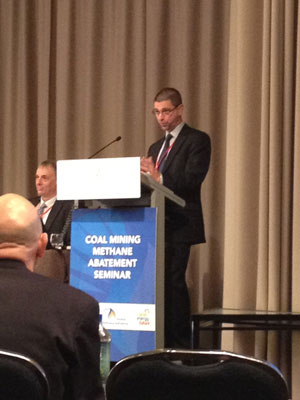 Wayne Calder of Australia's Department of Resources, Energy and Tourism addressing
Seminar participants in Sydney, Australia.
Wayne Calder of Australia's Department of Resources, Energy and Tourism addressing
Seminar participants in Sydney, Australia.
Under its
Clean Energy Future Plan
 ,
released in 2011 by the Australian Government to mitigate GHG emissions and move
towards a clean energy future, Australia introduced a carbon price and new programs
to promote innovation and investment in renewable energy. Under this Plan, the country
will cut at least 159 million metric tons of carbon dioxide equivalent (MMTCE) of
carbon pollution in 2020—equal to removing 45 million cars from the road.
The Plan has a goal of reducing GHG emissions by 80 percent of 2000 emissions levels
by 2050.
,
released in 2011 by the Australian Government to mitigate GHG emissions and move
towards a clean energy future, Australia introduced a carbon price and new programs
to promote innovation and investment in renewable energy. Under this Plan, the country
will cut at least 159 million metric tons of carbon dioxide equivalent (MMTCE) of
carbon pollution in 2020—equal to removing 45 million cars from the road.
The Plan has a goal of reducing GHG emissions by 80 percent of 2000 emissions levels
by 2050.
A key part of the plan—the carbon pricing mechanism—was initiated on 1 July 2012 with a fixed price period that will last for three years. The price will start at $23 per ton and will rise 2.5 percent each year. Beginning on 1 July 2015, the carbon price will transition to a flexible price under an emissions trading scheme, where the price will be determined by the market. The carbon price applies to more than 500 of Australia's largest GHG emitters, including a large portion of the coal industry.
The carbon pricing scheme will be linked to credible international carbon markets and emissions trading schemes beginning on 1 July 2015, coordinating with the flexible price period. At least half of a party's compliance obligation must be met through domestic permits or credits, but up to 50 percent of their liabilities can be met through eligible international units. This means that Australian companies can directly support abatement in other countries, so Australia plans to leverage its GMI relationships to find potential international projects in which to invest.
In addition to the carbon price, the Clean Energy Future Plan also includes assistance for many industries that will be affected by the new carbon pricing scheme. The Jobs and Competitiveness Program will provide $9.2 billion in assistance between 2012 and 2015 to safeguard jobs in industries with high emissions and international competition. The $1.2 billion Clean Technology Program will provide support to manufacturing industries to improve energy efficiency and reduce carbon pollution and conduct research and development activities to identify low pollution technologies.
Although the coal industry makes a strong contribution to Australia's social and economic welfare, coal also accounts for a significant portion of Australia's GHG emissions. In 2010, coal mining accounted for 28.3 MMTCE—or 5 percent of Australia's net GHG emissions.
A small number of existing coal mines have high fugitive emissions and will face
significant costs with the implementation of a carbon price. In response, the Australian
Government developed a transitional assistance package for the Australian coal industry
that recognizes the adjustment challenges faced by the industry. This package includes
the
Coal Sector Jobs Package (CSJP)
 and the
Coal Mining Abatement Technology Support Package (CMATSP)
and the
Coal Mining Abatement Technology Support Package (CMATSP)
 .
CSJP is a $1.3 billion package that will provide transitional assistance to help
the coal industry implement methane abatement technologies at the highest-emitting
mines, while CMATSP will provide $70 million to support the research, development,
and demonstration of CMM abatement technologies. The packages will support industry
efforts to develop technologies to safely reduce fugitive methane emissions, offer
transitional assistance to the most gassy mines, and support efforts to develop
abatement technologies for full-scale deployment.
.
CSJP is a $1.3 billion package that will provide transitional assistance to help
the coal industry implement methane abatement technologies at the highest-emitting
mines, while CMATSP will provide $70 million to support the research, development,
and demonstration of CMM abatement technologies. The packages will support industry
efforts to develop technologies to safely reduce fugitive methane emissions, offer
transitional assistance to the most gassy mines, and support efforts to develop
abatement technologies for full-scale deployment.
As a first step, Australia's Department of Resources, Energy and Tourism hosted
the Coal Mining Methane
Abatement Technology Seminar
 on 4-6 September 2012 in Sydney, Australia. The seminar's objectives, other than
raising awareness of the opportunities provided by CMATSP and how it will be used
to support technology development and transfer, included connecting the Australian
coal industry with domestic and international CMM abatement technology providers,
providing greater information for the Australian industry on future international
investment opportunities, promoting Australia's expertise and technologies relevant
to CMM recovery and use, and identifying safety and regulatory issues with the development
and deployment of CMM abatement technology.
on 4-6 September 2012 in Sydney, Australia. The seminar's objectives, other than
raising awareness of the opportunities provided by CMATSP and how it will be used
to support technology development and transfer, included connecting the Australian
coal industry with domestic and international CMM abatement technology providers,
providing greater information for the Australian industry on future international
investment opportunities, promoting Australia's expertise and technologies relevant
to CMM recovery and use, and identifying safety and regulatory issues with the development
and deployment of CMM abatement technology.
The seminar brought together a range of national and international stakeholder groups involved in the development and deployment of methane abatement solutions to consider and respond to the issues, challenges, and opportunities associated with the commercialization of these solutions. Approximately 145 delegates participated in the seminar over three days, which included a day and a half of technical sessions, the GMI Coal Subcommittee meeting, and a site tour.
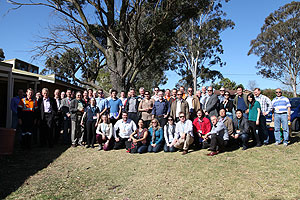 Participants after Appin WCMG power station and WestVAMP site tour in Sydney, Australia.
Participants after Appin WCMG power station and WestVAMP site tour in Sydney, Australia.
Each of the six technical sessions featured a different panel of speakers from multiple countries and backgrounds. Topics included:
- Policy drivers and international actions
- Avoiding methane emissions in ventilation air
- Progress on developing ventilation air methane (VAM) technologies
- Waste coal mine gas power station project experience
- Health, safety, and regulatory requirements and processes
- Measuring and monitoring emissions
A closing session followed the six sessions, featuring a panel comprised of the
moderators from the technical sessions. The panelists gave remarks summarizing and
commenting on the seminar. Sixty three delegates concluded the seminar on the last
day with a tour of the
Appin Waste Coal Mine Gas (WCMG)
 power station and the
West Cliff Ventilation Air Methane Project (WestVAMP)
power station and the
West Cliff Ventilation Air Methane Project (WestVAMP)
 .
WestVAMP has been in operation more than 5 years and is the oldest VAM processing
installation in the world.
.
WestVAMP has been in operation more than 5 years and is the oldest VAM processing
installation in the world.
Hosting the seminar in conjunction with the Coal Subcommittee meeting demonstrated Australia's continued support for reducing methane emissions—and all GHG emissions—globally. Australia would like to thank all of the participants and speakers for a successful seminar!
Subcommittee Updates
Tri-sector subcommittee meetings
On 2–3 July 2012, GMI held three concurrent sector subcommittee meetings in
Singapore: Agriculture, Municipal Solid Waste, and Municipal Wastewater.
The meetings were held in conjunction with
WasteMET Asia – ISWA Beacon Conference
 ,
the World Cities Summit
,
the World Cities Summit
 ,
and Singapore International Water Week
,
and Singapore International Water Week
 .
Each meeting addressed common themes, including development of technical and policy
session agendas for Methane Expo 2013 and new guidance
available for the development of sector-specific action plans, which Partner Countries
are encouraged to finish prior to the Expo. Attendees learned about current U.S.
EPA efforts to work with the Climate and Clean
Air Coalition (CCAC)
.
Each meeting addressed common themes, including development of technical and policy
session agendas for Methane Expo 2013 and new guidance
available for the development of sector-specific action plans, which Partner Countries
are encouraged to finish prior to the Expo. Attendees learned about current U.S.
EPA efforts to work with the Climate and Clean
Air Coalition (CCAC)
 on the short-lived climate pollutants initiative. The meetings were attended by
45 representatives from 23 countries.
Minutes from the Singapore meeting (PDF, 45 pp, 284 KB), as well as the
meeting presentations, are
available on the GMI website.
on the short-lived climate pollutants initiative. The meetings were attended by
45 representatives from 23 countries.
Minutes from the Singapore meeting (PDF, 45 pp, 284 KB), as well as the
meeting presentations, are
available on the GMI website.
Agriculture
The Agriculture Subcommittee conducted its 12th meeting while in Singapore. Delegates from Partner Countries Argentina, Ethiopia, India, Philippines, Thailand, and the United States participated, along with multiple Project Network members. The meeting included country updates and discussion of the subcommittee's draft Statement of Purpose, which was developed to encourage greater participation, better define the group's focus, and make the subcommittee's activities more beneficial to members. In addition, attendees discussed the development of an international best practice guide and case studies. The next meeting of the Agriculture Subcommittee will take place via teleconference, on 28 November 2012 at 9:00am eastern standard time. The final version of the subcommittee's Statement of Purpose was posted earlier this month.
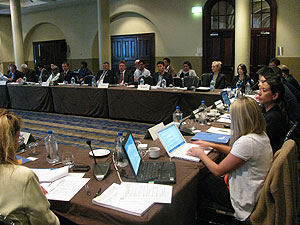 Attendees at the Coal Subcommittee meeting in Australia.
Attendees at the Coal Subcommittee meeting in Australia.
Coal
The Coal Subcommittee held
its 16th session on 5 September 2012, in Sydney, Australia, on
the second day of the Australian government's
Coal Mining Methane Abatement Seminar
 .
The meeting was attended by GMI Partner Country delegates, Project Network members,
ASG staff, and other guests. Forty-two people, representing six countries, were
present. Subcommittee meeting attendees discussed updates to country-specific and
sector-specific action plans and how to join the Project Network. A representative
from the U.S. Department of State discussed CCAC's
.
The meeting was attended by GMI Partner Country delegates, Project Network members,
ASG staff, and other guests. Forty-two people, representing six countries, were
present. Subcommittee meeting attendees discussed updates to country-specific and
sector-specific action plans and how to join the Project Network. A representative
from the U.S. Department of State discussed CCAC's
 initiatives to reduce short-lived climate pollutants. Representatives from Australia,
China, Mongolia, Poland, and
the United States reported on CMM activities. Project Network member
representatives from
MEGTEC Systems
initiatives to reduce short-lived climate pollutants. Representatives from Australia,
China, Mongolia, Poland, and
the United States reported on CMM activities. Project Network member
representatives from
MEGTEC Systems
 and the United Nations
Economic Commission for Europe (UNECE) Ad Hoc Group of Experts on CMM
and the United Nations
Economic Commission for Europe (UNECE) Ad Hoc Group of Experts on CMM
 also shared updates. The subcommittee also initiated plans for the coal mine technical
and policy sessions for Methane Expo 2013.
also shared updates. The subcommittee also initiated plans for the coal mine technical
and policy sessions for Methane Expo 2013.
Municipal Solid Waste
The Municipal Solid Waste (MSW) Subcommittee met on 2 July 2012 in Singapore. The meeting featured a discussion of new activities and resources the subcommittee will focus on to promote methane mitigation as well as avoidance strategies other than landfill gas (LFG). The co-chairs of the subcommittee plan to email a Web-based survey to members to prioritize activities. The subcommittee also held a roundtable discussion on Nationally Appropriate Mitigation Actions (NAMAs) for the waste sector. During this discussion Colombia, Ethiopia, and Serbia presented updates on each of their waste sector NAMAs. Many countries expressed a need to standardize the procedures used to calculate baseline emissions and methods used to monitor, report, and verify emission reductions achieved. The United States offered to prepare an assessment of MSW NAMAs as well as a framework for monitoring, reporting and verification elements that can be used to assist GMI partners in NAMA development. The next meeting of the subcommittee took place via teleconference, on 19 November 2012 at 7:00am eastern standard time.
Municipal Wastewater
The Latest GMI Resource: International Best Practices Guide
In September 2012, GMI launched the International Best Practices Guide for Landfill Gas Energy Projects, which provides valuable information on the project development process and common obstacles to developing LFG energy projects in developing countries. Consisting of seven chapters and 15 case studies in 10 different Partner Countries, the guide covers Basic Concepts of Integrated Solid Waste Management; Solid Waste Disposal Site Design and Operational Considerations; Design, Construction, and Operation of LFG Collection and Control Systems; LFG Energy Utilization Technologies; Market Drivers for LFG Energy Projects; LFG Modeling; and Project Economics and Financing. GMI sincerely thanks the expert reviewers as well as U.S. EPA for providing this resource.
GMI officially added the Municipal Wastewater Subcommittee as its fifth sector subcommittee in 2011 at the GMI meeting in Poland. Since then, the subcommittee has been busy recruiting delegates, developing the Municipal Wastewater Subcommittee Action Plan (PDF, 7 pp, 123 KB), and holding initial meetings to determine the focus and direction of the subcommittee.
The Municipal Wastewater Subcommittee held its first meeting via the Internet in April 2012. This initial meeting provided an overview of the new subcommittee, introduced delegates, and started the discussion on subcommittee goals and activities. In July 2012, the Municipal Wastewater Subcommittee held its first in-person meeting in Singapore. Meeting topics included a summary of the outcomes of the Internet-based meeting held on 18 April 2012; subcommittee membership and leadership, including the confirmation of two new co-chairs—Elias Freig (Mexico) and Federico Grullón (Dominican Republic)—to join Chris Godlove (United States); country updates from attendees; the Municipal Wastewater Subcommittee Action Plan; and planning for the Methane Expo 2013 in Vancouver, Canada.
Co-Chair Grullón invited his fellow co-chairs to the Dominican Republic on 19 October 2012, for a strategic planning meeting. The meeting focused on planning for Methane Expo 2013 and addressed the future development of wastewater resources; Project Network recruitment; and planning for the next subcommittee meeting, to be held via the Internet on 6 December 2012.
Going forward, the primary focus of the Municipal Wastewater Subcommittee will be identifying and promoting methane recovery and use opportunities and best practices at existing centralized municipal wastewater treatment facilities. In addition, the subcommittee will seek to identify a strategy for engaging global, regional, and national entities involved in planning and executing wastewater infrastructure in integrating methane mitigation and utilization into new projects. Specific strategies the Municipal Wastewater Subcommittee will consider include:
- Capacity building and outreach efforts
- Raising awareness about technologies
- Assisting with project financing
- Developing sector-specific and country-specific action plans
- Providing technical assistance to help assess the feasibility of projects
- Conducting demonstration projects
- Providing hands-on training and workshops
- Helping to leverage investment from the private sector and financial institutions
Additional information can be found in the Municipal Wastewater Subcommittee Action Plan (PDF, 7 pp, 123 KB).
Oil and Gas
The Oil and Gas Subcommittee continues its planning for speakers and agenda for Methane Expo 2013. The last subcommittee meeting in April was held in conjunction with the Natural Gas STAR Annual Implementation Workshop. It was a great success and several new countries attended for the first time. An overview from the meeting can be found in the last issue of Methane International.
Climate and Clean Air Coalition Goes to Ghana
In September 2012, government officials including GMI delegates from Ghana, policymakers,
industry representatives, and environmental experts representing 15 different African
countries met in Accra, Ghana. The 3-day event, hosted by the Environment
Ministries of Ghana and Nigeria with the support of the
CCAC
 ,
the African Climate Policy Center, and the United Nations Environment Programme,
sought to address the issue of short-lived climate pollutants in Africa and consider
methods to mitigate their environmental impact. Participants discussed promoting
best practices, showcasing successful reduction efforts, and reducing methane emissions
from fossil fuel production and the agriculture and waste sectors. Furthermore,
Andrew Eil from the U.S. Department of State presented a GMI overview. For more
information, visit the
UNEP news centre website
,
the African Climate Policy Center, and the United Nations Environment Programme,
sought to address the issue of short-lived climate pollutants in Africa and consider
methods to mitigate their environmental impact. Participants discussed promoting
best practices, showcasing successful reduction efforts, and reducing methane emissions
from fossil fuel production and the agriculture and waste sectors. Furthermore,
Andrew Eil from the U.S. Department of State presented a GMI overview. For more
information, visit the
UNEP news centre website
 .
.
Grant Supports LFG Workshop in Philippines
The Philippine Council for Industry, Energy and Emerging Technology Research and
Development (PCIEERD), in coordination with the National Solid Waste Management
Commission and GMI, hosted a workshop on the basics of LFG energy project planning,
design, and financing, as well as discussed opportunities for LFG capture and use
in the Philippines. This workshop was the third in a series for
which PCIEERD received U.S. EPA funding for capacity building.
Presentations
 and a
workshop report are posted.
and a
workshop report are posted.
Biogas Development in Pakistan
In 2010, Winrock International received a U.S. EPA grant to build capacity in
Pakistan to support commercial biogas development on the country's
medium-sized dairy farms. The project's objectives simultaneously address issues
of electricity shortages and low financial returns on farmers. The project involves
conducting feasibility studies to identify good candidate locations and providing
facilitation and training services for installing and operating biogas plants. In
the future, Winrock hopes to create awareness of potential revenues and facilitate
connections among farms, financial institutions, and technology suppliers by organizing
interactive meetings. Activities and updates are outlined on the
project fact sheet
 .
.
GMI Outreach
Asia
U.S. EPA's Summer 2012 issue of Coalbed Methane Extra contains an article "Financing CMM and VAM Projects." (PDF, 14 pp, 915 KB)
April 2012, Bei Bei City, China. Representatives of the Tianfu Mining Company shared details with GMI representatives on two mines that are being evaluated for reducing fugitive methane emissions. Zunyi Gas and representatives from Guiyang's Development and Reform Commission also participated in discussions on potential future CMM projects.
July 2012, Singapore. EPA wastewater sector staff presented at Singapore International Water Week as part of a panel session discussing the importance of reducing methane emissions from municipal wastewater treatment operations. EPA also met with the International Solid Waste Association's (ISWA's) Science and Technology Committee to discuss GMI's past, present, and future collaboration with ISWA.
July 2012, Jakarta, Indonesia. EPA MSW sector staff co-hosted a landfill operations and maintenance workshop in collaboration with the Ministry of Public Works and the Indonesian Solid Waste Association. Participants included officials from Indonesian municipalities, many of whom expressed interest in collaborating with GMI to explore opportunities to reduce methane emissions.
July 2012, Wuhan and Beijing, China. EPA MSW sector staff met with GMI delegates and other stakeholders and conducted landfill site visits to explore potential sites for the operations and maintenance training workshop for landfill operators scheduled to take place in March or April 2013.
August 2012, Ulaanbaatar, Mongolia. An EPA coal sector expert met with government officials to discuss coal sector activities, and visited several state-owned coal mines who are participating in a resource assessment, as well as a private sector mine where GMI is conducting a CMM pre-feasibility study.
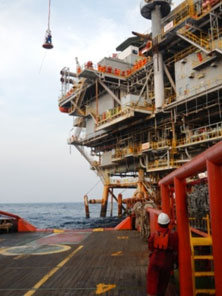 Star Energy's KF oil and gas production platform, Natuna Sea, Indonesia.
Star Energy's KF oil and gas production platform, Natuna Sea, Indonesia.
September 2012, Jakarta, Indonesia. EPA oil and gas sector staff
supported the second Asia Pacific Global Methane Initiative Oil & Gas Sector
Workshop which was hosted by Pertamina and cosponsored by Star Energy, the Society
of Petroleum Engineers, BPMIGAS, and the World Bank's
Global Gas Flaring Reduction (GGFR) Partnership
 .
Pertamina hosted a site visit to its Tambun oil production facility where methane
leak detection and measurement techniques were demonstrated. Following the workshop,
a methane leak identification and measurement study was conducted at Star Energy's
Kakap offshore oil and gas production facilities.
.
Pertamina hosted a site visit to its Tambun oil production facility where methane
leak detection and measurement techniques were demonstrated. Following the workshop,
a methane leak identification and measurement study was conducted at Star Energy's
Kakap offshore oil and gas production facilities.
Australia
September 2012, Perth, Australia. EPA oil and gas sector staff
presented a paper co-authored with ONGC (India) titled, International
Collaboration to Advance Sustainable Oil & Natural Gas Production and Climate
Protection at the International Conference
on Health, Safety & Environment in Oil and Gas Exploration and Production
 .
The
conference paper
.
The
conference paper
 provides details on ONGC's methane emission reductions.
provides details on ONGC's methane emission reductions.
Europe
July 2012, Sofia, Bulgaria. EPA MSW sector staff met with the Ministry
of Environment and Water and other stakeholders to start the development of a national
methane strategy. EPA also met with organizers of the
South-East European Exhibition and Conference for Waste Management, Recycling and
Environment
 ,
taking place in May 2013, to discuss workshop ideas and speakers.
,
taking place in May 2013, to discuss workshop ideas and speakers.
September 2012, Sofia, Bulgaria. EPA MSW sector staff met with Bulgarian GMI partners to discuss their waste sector methane action plan and emissions inventory. Participants agreed on a timeline for completion as well as presenting the information at a future workshop.
September 2012, Kiev, Ukraine. EPA MSW sector staff presented at
the 8th International
Conference on Biomass for Energy
 and visited three landfills near Kiev with a local engineering firm and LFG energy
developer.
and visited three landfills near Kiev with a local engineering firm and LFG energy
developer.
October 2012, Moscow, Russia. The
Environmental Defense Fund
 ,
the World Bank-led
GGFR
,
the World Bank-led
GGFR
 Partnership and EPA hosted a two-day workshop on methane emission control for the
oil and gas sector. Participants focused on how to rapidly achieve global, national,
and local benefits by minimizing natural gas losses and flaring.
Partnership and EPA hosted a two-day workshop on methane emission control for the
oil and gas sector. Participants focused on how to rapidly achieve global, national,
and local benefits by minimizing natural gas losses and flaring.
Middle East and North Africa
May 2012, Kuwait, Saudi Arabia, and Qatar. EPA oil and gas sector staff met with key government officials and led technical discussions on methane emission reduction project opportunities to begin building organizational relationships.
North America
April 2012, Washington, D.C, United States. GMI participated in
the U.S.-India Energy
Partnership Summit, which focused on clean energy for mitigating climate
change and removing barriers to technology transfer.
Session summaries
 ,
which include policy insights, discussions on how to remove technology transfer
barriers, and economic opportunities for businesses, are available.
,
which include policy insights, discussions on how to remove technology transfer
barriers, and economic opportunities for businesses, are available.
June 2012, Mexico City, Mexico. EPA oil and gas sector staff gave a presentation on PEMEX's work to quantify and reduce their methane emissions at PEMEX's Second Annual Environmental Workshop. EPA also met with representatives from the Mexican energy and environmental ministries to discuss opportunities for collaboration.
In July 2012, U.S. EPA's LMOP program published
Going Abroad with Landfill Gas Energy: Taking the Success of Direct Use in the United
States to the International Community (PDF, 10 pp, 615 KB)
 .
.
September 2012, Mexico City, Mexico. EPA MSW sector staff spoke
at the 20th Green
Expo and International Environmental Congress
 on the topic of advancing LFG energy and hosted a booth.
on the topic of advancing LFG energy and hosted a booth.
Central America/ South America
April 2012, Belo Horizonte, São Paolo and Rio de Janeiro, Brazil. EPA MSW sector staff met with public and private representatives, conducted landfill and wastewater site visits, and attended a waste management training workshop. EPA met with Brazil's Environment State Foundation, assessed progress at the Contagem landfill, and discussed project opportunities at the Belo Horizonte landfill, Geroncinco landfill, and Nemak plant.
April 2012, Coquimbo and Santiago, Chile. EPA MSW sector staff
supported the operations and maintenance for landfill operations component at a
national training seminar
 sponsored by the Secretariat for Urban and Regional Development of Chile (SUBDERE)
National Solid Waste Program. EPA also met with the Ministry of Environment to discuss
initiatives in the wastewater sector, visited the biogas recovery and utilization
project at La Farfana, and conducted an LFG Biogas working group meeting.
sponsored by the Secretariat for Urban and Regional Development of Chile (SUBDERE)
National Solid Waste Program. EPA also met with the Ministry of Environment to discuss
initiatives in the wastewater sector, visited the biogas recovery and utilization
project at La Farfana, and conducted an LFG Biogas working group meeting.
May 2012, Colombia. EPA oil and gas sector staff participated in an Eco-Efficiency Forum sponsored by Colombia's state-owned oil and gas company, Ecopetrol. Participants discussed recommendations and best practices on a variety of environmental topics, including addressing methane emissions from Ecopetrol operations.
September 2012, Rio de Janeiro and São Paulo State, Brazil.
EPA MSW sector staff visited the
Gramacho
 and Seropedica landfills, and met with the State Secretariat for the Environment
to discuss opportunities to conduct training and capacity building workshops.
and Seropedica landfills, and met with the State Secretariat for the Environment
to discuss opportunities to conduct training and capacity building workshops.
Recent Developments and Resources
Philippines Registers Agricultural Project for Carbon Credits
The Land Bank of the Philippines is helping pig farmers manage animal waste and turn the captured methane emissions into carbon credits. The project is the first animal waste management project in Southeast Asia to be registered by United Nations Framework Convention on Climate Change. The Land Bank, with assistance from GMI and the World Bank, is coordinating and managing the installation of anaerobic digester systems that capture methane and generate carbon credits for each ton of methane captured. The Spanish Carbon Fund, administered by the World Bank, buys the carbon credits, providing the farms with an additional source of revenue. Some of the farms will also generate electricity from this renewable energy source. The World Bank estimates that once fully implemented, the program will produce more than 100,000 carbon credits per year from dozens of pig farms across the country.
Source: Land Bank of the Philippines, "LANDBANK
biogas CDM Program for piggeries first of its kind in PH, Southeast Asia,"
 September 12, 2012.
September 12, 2012.
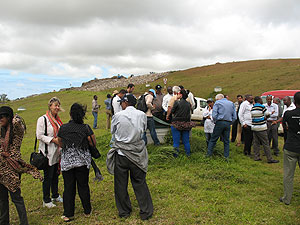 Workshop attendees tour Mare Chicose Landfill during the site visit day in Flic
en Flac, Mauritius.
Workshop attendees tour Mare Chicose Landfill during the site visit day in Flic
en Flac, Mauritius.
LFG Workshop in Mauritius
In September 2012, in Flic en Flac, Mauritius, U.S. EPA provided support for the Coastal East Africa Solid Waste Management and Gas to Energy Best Practices Workshop (PDF, 3 pp, 43 KB). Many of the countries of East Africa and the region's surrounding islands lack adequate infrastructure, information, and resources to manage solid waste in an efficient manner. The workshop provided information on the elements of integrated solid waste management appropriate for the region, including landfill operations and maintenance and approaches to reduce methane, such as recycling, composting, and developing LFG energy projects in East Africa. The approximately 50 attendees shared information and experiences, discussed cross-cutting issues, and learned about best practices and appropriate solutions. Presentations included an overview on integrated solid waste management, lessons learned, proper landfill design and maintenance, status of solid waste management in individual cities and countries, and successes and challenges across the region.
Carbon Credits in Africa
In June 2012, with support from GMI, the Lagos Waste Management Authority (LWMA),
the Lagos state government of Nigeria, and
C40 Cities
 (a Clinton Climate Initiative program), organized a workshop on
Developing Successful Integrated Waste Management Systems
(a Clinton Climate Initiative program), organized a workshop on
Developing Successful Integrated Waste Management Systems
 in Africa. The workshop included information on LFG energy projects and integrated
solid waste management. Before the end of the year, LWMA will become the first entity
on the entire African continent to earn carbon credits from its waste management
system. The workshop, which included participants from Ghana,
Sierra Leone, and Ethiopia, was designed for sharing
LWMA's experience and to help start the development of an African LFG model to calculate
gas generation and recovery.
in Africa. The workshop included information on LFG energy projects and integrated
solid waste management. Before the end of the year, LWMA will become the first entity
on the entire African continent to earn carbon credits from its waste management
system. The workshop, which included participants from Ghana,
Sierra Leone, and Ethiopia, was designed for sharing
LWMA's experience and to help start the development of an African LFG model to calculate
gas generation and recovery.
Source: Akinpelu Dada, "Lagos
to earn income from waste management,"
 The Punch, July 2, 2012.
The Punch, July 2, 2012.
In this edition:
- Register Now for Methane Expo 2013
- Spotlight on Australia: Coal Mining Methane Abatement Seminar Hosts
- Subcommittee Updates
- Climate and Clean Air Coalition Goes to Ghana
- Grant Supports LFG Workshop in Philippines
- Biogas Development in Pakistan
- GMI Outreach
- Recent Developments and Resources
ASG Corner
 Ashley
Brosius is the new Oak Ridge Institute for Science and Education Fellow at the ASG
and will support GMI activities, including Expo planning in the coming months. Ashley
holds a dual master's degree in natural resources and sustainable development from
American University in Washington, D.C., and the University for Peace in Costa Rica.
Before joining GMI, Ashley worked with Carolinas Integrated Sciences and Assessments,
a NOAA-funded climate science program at the University of South Carolina. Ashley
worked with local-, state-, and federal-level agencies, as well as with academia,
the private sector, and non-governmental organizations, to raise awareness of climate
impacts. Ashley is especially interested in advancing effective climate change communication
strategies. In her non-work life, Ashley enjoys running, sailing, and film festivals.
Please join us in welcoming Ashley to the team.
Ashley
Brosius is the new Oak Ridge Institute for Science and Education Fellow at the ASG
and will support GMI activities, including Expo planning in the coming months. Ashley
holds a dual master's degree in natural resources and sustainable development from
American University in Washington, D.C., and the University for Peace in Costa Rica.
Before joining GMI, Ashley worked with Carolinas Integrated Sciences and Assessments,
a NOAA-funded climate science program at the University of South Carolina. Ashley
worked with local-, state-, and federal-level agencies, as well as with academia,
the private sector, and non-governmental organizations, to raise awareness of climate
impacts. Ashley is especially interested in advancing effective climate change communication
strategies. In her non-work life, Ashley enjoys running, sailing, and film festivals.
Please join us in welcoming Ashley to the team.
Sincerely,

Henry Ferland
Co-Director, ASG

Monica Shimamura
Co-Director, ASG